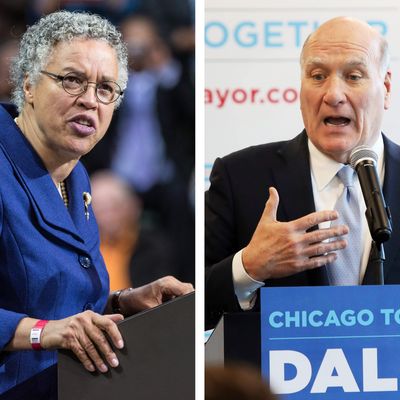
Chicago is a city with famously turbulent politics often disguised by stability in the mayor’s office, which has been occupied since 1989 by two white men with a reputation as icons of the local and national Democratic Establishment, Richard M. Daley and Rahm Emanuel. All that ended when Emanuel surprised most observers by announcing last summer that he would not run for reelection.
As voters prepare to go to the polls tomorrow in the first round of an election to choose Emanuel’s successor, there are 14 candidates running, including five who, according to a recent poll, are viable candidates for one of the two spots in an April runoff (assuming no one stuns the world by winning over 50 percent in the first round). The two narrow front-runners, according to most accounts, are both arguably Establishment figures as well, and have certainly been familiar parts of the local political landscape for many years: Bill Daley, former U.S. Commerce secretary and White House chief of staff (and also brother of the aforementioned Richard M. Daley, and son of the family patriarch, former mayor Richard J. Daley) and Toni Preckwinkle, the Cook County board president. These two septuagenarians (Daley is 70, Preckwinkle is 71) have the money and the name ID to win what is likely to be a very low-turnout election. But neither has performed strongly enough to preclude an upset.
Daley is, to put it mildly, dealing with perceptions that he represents the city’s past and its long-dominant business interests at a time when their power is being questioned intensively. Preckwinkle, who is African-American, was the early front-runner, but her progressive-reformer persona has been significantly damaged by her ties to Chicago alderman Edward Burke, the target of a major federal corruption investigation. Preckwinkle is also associated with an unpopular soda tax proposal. But she did snag two very important union endorsements, from the Chicago Teachers Union and three major SEIU locals.
Her perceived problems have created a possible opening for other self-identified progressives, particularly given a political atmosphere dominated by the closely related issues of gun violence, police corruption, and police racism. The most prominent is probably former prosecutor Lori Lightfoot, an openly gay African-American given a major role by Emanuel in examining police issues. She eventually broke with Emanuel over his unwillingness to go as far as she wanted in pursuing corruption and reversing racism, and got into the mayoral race even before he got out. But coming up on an outside track is another African-American woman, community activist Amara Enyia, who has received endorsements and major financial backing from Chance the Rapper and Kanye West.
The large field has some other possible top-two finishers as well. State comptroller Susana Mendoza was damaged by links to figures in the Burke scandal nearly as much as Preckwinkle, but has high name recognition, status as one of the two viable Latinos in the race, and an endorsement from the United Auto Workers. The other Latino contender is long-time Chicago finance director Gery Chico, who was once Richard Daley’s chief of staff and who lost to Emanuel in 2011. And Daley could lose some white moderate-to-conservative votes to former police superintendent Garry McCarthy, who was fired by Emanuel in the wake of the highly corrosive controversy over the 2014 Chicago police killing of Laquan McDonald, an African-American teenager.
Though turnout in the first round will by all accounts be terrible, participation in the runoff may well be significantly higher, as it was in the 2015 race won by Emanuel. Issue differentiation should rise in the runoff as well, particularly if Daley is one of the top-two finishers. At this point, given the Zeitgeist in the city, Anyone Other Than Daley will probably be the runoff favorite, unless he fails to make the cut, which could produce an entirely different dynamic. The odds are that Chicago will move to the left once it’s all said and done, which will, of course, be overinterpreted as an omen for 2020. It’s a city whose problems are so pronounced that it deserves to be taken seriously as something other than a mirror of national trends.






























